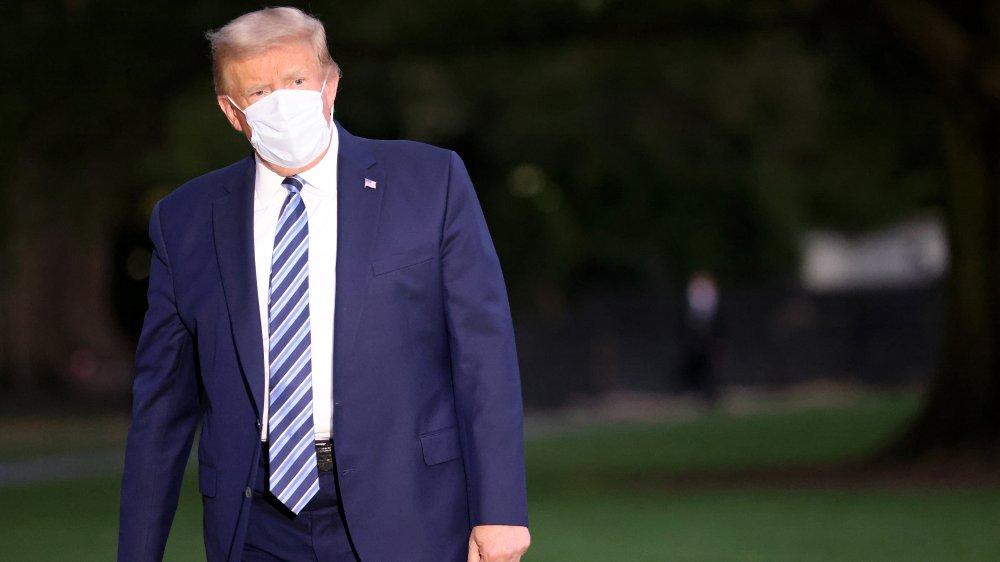Doctor Explains Why Trump Isn't Out Of The Woods Yet With His COVID-19 Diagnosis
To say that President Donald Trump is feeling buoyant about his coronavirus recovery is an understatement. "I feel better than I did 20 years ago!" Trump tweeted on Monday shortly before leaving Walter Reed Medical Center. So revived was our Commander-in-Chief by his hospitalization for a life-threatening infection that's killed more than 210,000 Americans since March, that within an hour of his return to the White House, the Trump reelection campaign released a video about how Trump had "beat" COVID-19 (per CNN).
Medical experts are concerned, however, that Trump is not out of the woods yet. Dr. Jennifer Haythe, Associate Professor of Medicine in the Center for Advanced Cardiac Care at Columbia University Irving Medical Center, has worked on the frontline of the COVID-19 epidemic. In an interview with The List, she said it's too early to say the president, indeed, has made a full recovery. "Looking back on what we experienced in the spring and early summer, some patients developed more severe symptoms around seven to 10 days," said Haythe, who is also Co-Director of the Columbia Women's Heart Center and Director of the Cardio-Obstetric Program. "Worsening symptoms include recurrence of fever, shortness of breath, cough and progression of pneumonia."
President Trump has risk factors for a more severe coronavirus outcome, cardiologist says
According to Haythe, who is a board-certified cardiologist, statistically, Trump is more likely to have complications from his infection than someone who is younger and at an average body weight. "From what we know, President Trump's biggest risk factors for more severe COVID-19 illness are his age and his weight," she explained. Trump is 74 years old and has a BMI of 30.5; a normal BMI is 19-24 (per Bloomberg).
That being said, the aggressive treatments Trump has received may mean he fares better than other men with the same age and level of obesity, Haythe noted. "While we know that older men with obesity are at increased risk for severe illness, President Trump's course will be hard to predict as he was treated with novel therapeutics which may shorten the course and decrease the severity of his illness," she explained. "President Trump was treated with very aggressive therapies, including one antibody therapy that is not FDA approved, as well as Remdesivir, which was given approval for severe COVID-19 as well as steroids, which are also indicated for more severe disease. However, we cannot assume he had severe disease, as these drugs may have been given as a precaution."
Doctor offers suggestions for a healthy recovery from coronavirus
Trump has been eager to get back to work, and just returned to his desk in the Oval Office (per ABC). His personal physician Sean Conley has said the president has recovered quickly and no longer has a fever. But might he be jumping out of the hospital bed too quickly? Haythe said anyone who has coronavirus and has been sick should take it easy. "Patients experiencing COVID-19 illness are advised to rest, stay hydrated, carefully monitor symptoms, and call their doctor with any changes," she said. "In addition, frequent checks of oxygen saturation are important."
Trump's medical team is keeping close tabs on his temperature and other vital signs (per U.S. News & World Report). According to Haythe, there are a few specific changes that would signal a cause for concern. "A drop in oxygen saturation, high fever, and cough are concerning, as this suggests possible COVID-19 associated pneumonia — which we know can progress to acute respiratory distress syndrome, or ARDS, which can be life-threatening," she explained.


